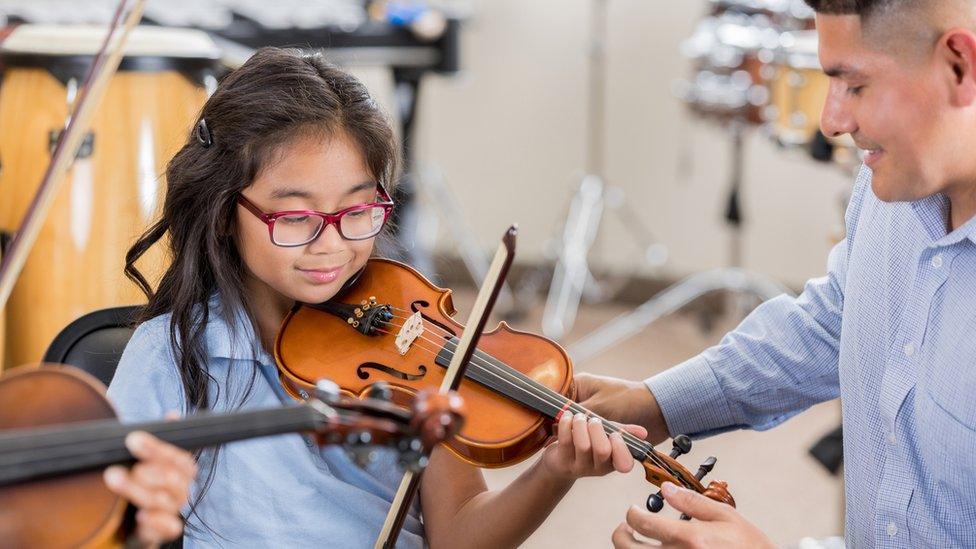Fears for the future of music lessons in schools
- Published
- comments

Music lessons in England schools could be under threat unless central government covers the cost of a pay rise for teachers, councils claim.
In July, the government agreed to fund a 3.5% rise for lower-paid teachers and 1.5% and 2% for higher-paid teachers, senior staff and head teachers.
But councils say this does not cover centrally employed teachers, most of whom offer music lessons in schools.
The government says it is in discussion with councils over this issue.
What is the problem?
The Local Government Association (LGA) is concerned that young people will miss out on music lessons if councils have to cut back.
It says the extra cost of a 1 to 2.5% pay rise for centrally employed teachers will be around £5.5m - a cost that councils have not budgeted for.
With councils facing a challenging financial landscape, the LGA is warning that many will have little choice but to cut back on services like music tuition.
Is it just music teachers?
No. While the majority of these posts are within music teaching, other roles centre around additional support for specific groups.
For example:
teachers who work with children from black and minority ethnic backgrounds and traveller heritages
teachers supporting disabled children
those teaching outside school environments, such as within a secure unit
those supporting schools with early years provision.
There are currently around 4,900 centrally employed teachers in England.
What does the LGA say?
The LGA fears certain types of education provision will be cut.
Cllr Anntoinette Bramble, chair of the LGA's children and young people board, says: "While we were pleased that the government announced that it would fully fund a pay increase for teachers in the summer, it needs to extend this to fund the pay rise for centrally employed teachers, such as those providing music tuition.

"Local government is already under massive financial pressure with many services over-stretched.
"If this additional cost is left for councils to pick up then they will be put in the very difficult position of being forced to reduce certain types of education provision, including music teaching."
What do school leaders say?
Paul Whiteman, general secretary of school leaders' union NAHT, says schools are already facing pressures on their budgets.
"Local authorities have also suffered ruinous funding cuts over the last 10 years, and cannot now be expected to find the money for millions of centrally employed teachers' pay rises with no additional money from the government at all.
"It is very easy in this situation to see how music could simply slip off the list of priorities entirely, cheating a generation of children out of the opportunity to explore their talents and denying them the benefits music education can bring."
What does the government say?
A spokeswoman for the Department for Education said: "The number of teachers centrally employed by councils represents around 1% of the teaching workforce and we are in discussions with a range of stakeholders, including the Local Government Association, about this issue.
"Our £300m music hubs programme is ensuring every primary or secondary school pupil has the opportunity to learn to play an instrument.
"We are considering how the pay rise affects those teachers employed as part of the scheme."
- Published24 July 2018

- Published30 January 2018